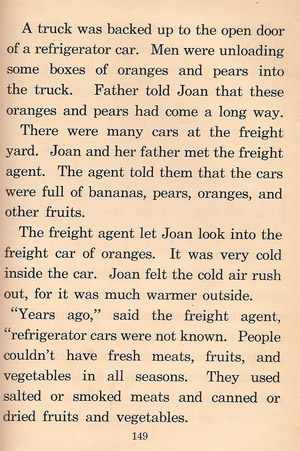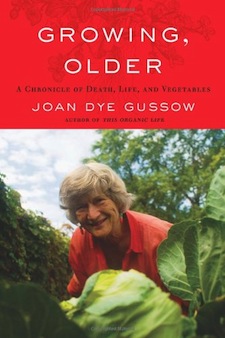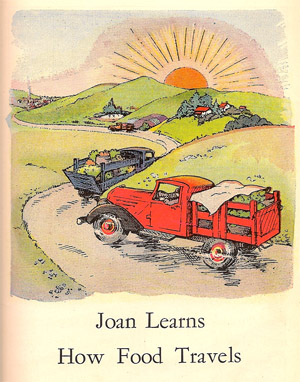Joan Gussow's Extreme Garden Makeover
Just PublishedGrowing, Older
|

Neighbors and Helpers By Grace E. Storm 1936
(any resemblance to our Joan is purely coincidental)
GUSSOW'S GREATEST HITS
Can an Organic Twinkie be Certified?
PCBs for Breakfast & Other Problems of a Food System Gone Awry
Growth, Truth and Responsibility: Food is the Bottom Line
Some Impractical Thoughts on TV & Nutrition Education
Food Security in the US a Nutritionist's Viewpoint
Can Industry Afford a Healthy America?
Nutrition Education in a World of Limits
Food Wanting & Needing & Providing
Joan's Work Joan is the author, coauthor or editor of numerous articles and books: Disadvantaged Children: Health Nutrition and School Failure (with Herbert Birch), 1970; The Feeding Web: Issues in Nutrition Ecology, 1978; The Nutrition Debate (with Paul Thomas), 1986; Chicken Little, Tomato Sauce and Agriculture: Who Will Produce Tomorrow's Food?, 1991; and This Organic Life: Confessions of a Suburban Homesteader, 2001. Essays, talks, articles and quotes by Joan: From This Organic Life: Confessions of a Suburban Homesteader: • Vegetable gardens, as this book is intended to say, are much more important than houses in the overall scheme of things. Agriculture is the foundation of civilization. Houses come and go, but soil must be cherished if food is to be grown for us to eat. • It never ceases to amaze me what even a small piece of land lovingly tended can produce. • I live without TV and air-conditioning, so perhaps what's most upsetting to a planet-watcher like me is the unchanged media focus on celebrities, sports, scandals, wars, and endless political campaigns--all in the service of selling things. After more than two centuries of American exceptionalism, after a hundred years of awe at the astonishing changes science has wrought, after fifty years of being convinced that we need the latest version of everything, most of us just don't get it where our relationship with Nature is concerned.From Farm Aid: A Song For America: It's so encouraging to watch the breakdown of agricultural ignorance in communities across the country, as increasing numbers of eaters realize how unhappy they are with the things to eat that agribusiness has brought them... ...so while there continues to be pain and grief and loss on farmlands across the nation, there is also hope and determination to make a different system, one where vibrant local economies are based on thriving family farms, small-scale business enterprises, and markets featuring fresh local food year-round--economies that will make farming once again a desirable lifestyle, so that handing down the farm to one's children will no longer seem like a punishment but a privilege. If we level the playing field for producers by taking away the policies that support the present industrial food system--cheap fuel and water, public funding of high-tech agricultural research, massive public investments in infrastructure (including overbuilt highways to handle giant truckloads of traveling food)--we can invest the money saved in a food system that conserves soil, water, air, and human resources, and produces reasonably priced food.From The Many Wonders of Plants, an article written for The Center For Ecoliteracy: A young child, seated in a grocery cart as it moves down aisle after dazzling aisle, would find it daunting to connect the colorful packages she sees with anything in the natural world; and so would her parents! The products that turn up on supermarket shelves seem to have been constructed not from plants, but from "ingredients" that have themselves been manufactured somewhere "out there." To trace the origins of Froot Loops that have no fruits, and chocolate creme pies that have neither cream nor chocolate would defy most adults. For most children, as we know, to imagine back from the supermarket to the real source of foods is all but impossible. This is not an accident. The manufacturers of the products filling the shelves profit most from foods with the least obvious relationship to the Earth.From Eating Responsibly, a keynote speech given by Joan on the eve of the invasion of Iraq: I think the deepest, most pervasive problem humanity has in dealing with the earth-in recognizing the earth as something to be dealt with-is the degree to which our technological inventions have progressively seduced what is now a large proportion of the human race into a conviction that we can, on the whole, discount the natural world. Indeed, technology has seduced some of my academic colleagues into the belief that nothing is really "unnatural" and that science and technology have got most things pretty well under control-which, they would see as a good thing. Too many of us are, in our arrogant naiveté rather like the stockbroker looking out the window of her 64th floor Manhattan office and experiencing an exhilarating sense of freedom at the sight of New York City at her feet. In reality, she is utterly unfree, tied to an umbilical cord of air-conditioning, heating, and lighting, to the pumps that draw water up from the street level to provide pressure in her private kitchen and bathroom, to the reliability of the elevators that allow her to arrive in her office ready for work, instead of winded from 64 flights of stairs. Accustomed as she is to ignoring the massive inputs of fossil energy that once thrust into the air the tower that surrounds her, and the further massive inputs that are expended daily to keep her world functioning, she imagines she is self-reliant. Articles, blog posts, and quotes about Joan: From Movement Matriach, Brian Halweil's profile of Joan for Edible Manhattan: Last spring, when hundreds of alums and faculty of the nutrition program of Columbia University Teachers College gathered to commemorate the department's 100th anniversary, one speaker riveted the audience. Shoulders back, patrician chin jutting forward, Joan Gussow strode toward the stage. A recent octogenarian, she remains in remarkable shape. "Good morning. I don't come with slides," the seasoned speaker quipped to immediate laughter. "But I have to say that if anyone told me 35 years ago that I would be speaking after a Manhattan borough president had talked about New York City's foodshed, I would have thought they were smoking dope." More laughter and applause. "So this is a thrilling moment for me..." ...These days, denouncing the perils of our food supply seems common- and like common sense-but Gussow's been doing so for decades, and although most food activists today are echoing her ideas, a substantial number of her students and nearly all her peers once considered her certifiably insane for drawing a direct connection between the way we farm and the way we eat. From Michael Pollan's In Defense Of Food:
From Green Fork Editor Leslie Hatfield's blog post Dispatch from Piermont: Joan Gussow’s organic garden: Those of you who’ve read Gussow’s memoir, This Organic Life, can imagine how we excited we were to step out her back door and feast our eyes on her garden, set against the blue waters of the Hudson River, whose humble beginnings and subsequent flourishing were chronicled in the book.From In the Garden with Bill Cary, A Visit With Joan Gussow, which features a wonderful series of photos taken in Joan's garden in 2008: I had spoken to Joan by phone a few times in recent years for other stories, but we had never met until yesterday morning. She proved to be just as delightful as I expected: warm, wise, funny and very engaging. |

